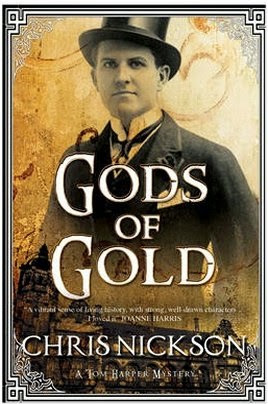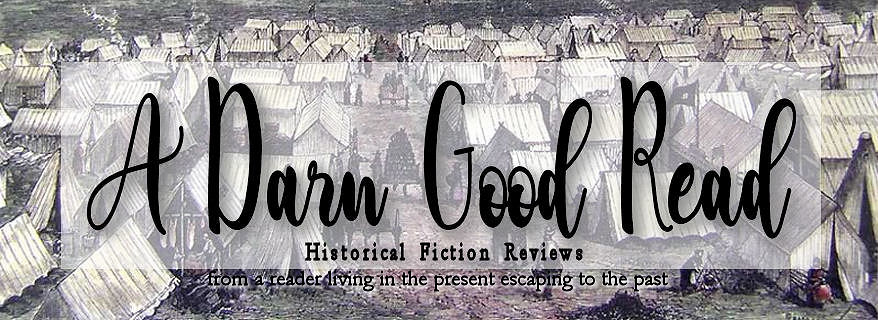The Broken Token (The Richard Nottingham Mysteries #1)
Leeds, England, 1731.
When Richard Nottingham, Constable of Leeds, discovers his former housemaid murdered in a particularly sickening manner, his professional and personal lives move perilously close. Circumstances conspire against him, and more murders follow. Soon the city fathers cast doubt on his capability, and he is forced to seek help from an unsavory source. Not only does the murder investigation keep running into brick walls as family problems offer an unwelcome distraction; he can't even track down a thief who has been a thorn in his side for months. When answers start to emerge, Nottingham gets more than he bargains for.
The next in the series is Cold Cruel Winter, followed by The Constant Lovers (#3), Come the Fear (#4), At The Dying Year (#5) and Fair and Tender Ladies (#6)
The Detective Inspector Tom Harper Mysteries is a relatively new series by Chris Nickson consisting of two books so far. It was the second book in the series, Two Bronze Pennies, that caught my eye first.
 June 1890. Leeds is close to breaking point. The gas workers are on strike. Supplies are dangerously low. Factories and businesses are closing; the lamps are going unlit at night. Detective Inspector Tom Harper has more urgent matters on his mind. The beat constable claims eight-year-old Martha Parkinson has disappeared. Her father insists she's visiting an aunt in Halifax - but Harper doesn't believe him. When Col Parkinson is found dead the following morning, the case takes on an increasing desperation. But then Harper's search for Martha is interrupted by the murder of a replacement gas worker, stabbed to death outside the Town Hall while surrounded by a hostile mob. Pushed to find a quick solution, Harper discovers that there's more to this killing than meets the eye - and that there may be a connection to Martha's disappearance.
June 1890. Leeds is close to breaking point. The gas workers are on strike. Supplies are dangerously low. Factories and businesses are closing; the lamps are going unlit at night. Detective Inspector Tom Harper has more urgent matters on his mind. The beat constable claims eight-year-old Martha Parkinson has disappeared. Her father insists she's visiting an aunt in Halifax - but Harper doesn't believe him. When Col Parkinson is found dead the following morning, the case takes on an increasing desperation. But then Harper's search for Martha is interrupted by the murder of a replacement gas worker, stabbed to death outside the Town Hall while surrounded by a hostile mob. Pushed to find a quick solution, Harper discovers that there's more to this killing than meets the eye - and that there may be a connection to Martha's disappearance.Two Bronze Pennies (The Detective Inspector Tom Harper Mysteries #2)
Leeds, England, Christmas Eve, 1890. DI Tom Harper is looking forward to a well-earned rest. But it's not to be. A young man has been found stabbed to death in the city s poverty-stricken Jewish district, his body carefully arranged in the shape of a cross, two bronze pennies covering his eyes. Could someone be pursuing a personal vendetta against the Jews?
Harper's investigations are hampered by the arrival of Capitaine Bertrand Muyrere of the French police, who has come to Leeds to look into the disappearance of the famous French inventor Louis Le Prince, vanished without trace after boarding a train to Paris.
With no one in the close-knit Jewish community talking to the police and with tensions rising, DI Harper realizes he'll have to resort to more unorthodox methods in order to unmask the killer.
These two series appeal to me because of their setting. Leeds is a city I remember from my childhood, though I don't know much of its history only that it was, like many towns in Yorkshire, famous for its woollen mills. So I'm hoping these novels have lots of historical detail, as well as being great mysteries.
Chris Nickson has a post on his blog entitled So Why Do I Write Historical Crime? It's always interesting to know why an author has chosen to write in a particular genre. I found it very informative.



I'm really in to historical mysteries these days. Thank for the recommendations.
ReplyDeleteYou're welcome. I find I'm reading more historical mysteries than I used to and really enjoying them.
DeleteI haven't read either of these series but have enjoyed another historical crime novel of his, The Crooked Spire (set in Chesterfield, not Leeds). I'll look out for these books.
ReplyDeleteI've read good reviews of this book, including your own. When I first came across it I hadn't realized it was the first in another series.
Delete